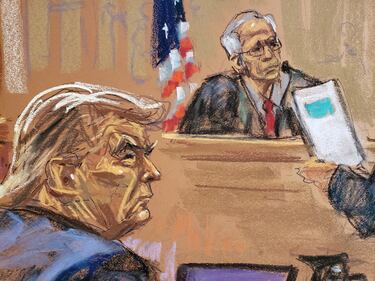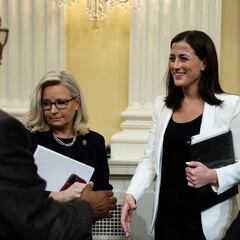Donald Trump’s New York fraud trial: When is the verdict expected?
Judge Engoron heard closing statements in the fraud lawsuit against Trump in New York which already found him liable. Soon he’ll dictate the final penalty.

The civil lawsuit brought by New York State against Donald Trump, his businesses and co-defendants wrapped up in December. More than 40 witnesses testified in the case that played out over 10 weeks after which New York Attorney General Letitia James increased the fine sought from $250 million to $370 million based on what was heard in the courtroom.
However, this is not the end of the story, as the wait continues to find out the final result of the case. Each side was given the chance to plead their side one last time in closing statements on Thursday.
Trump originally was not going to be allowed to speak after failing to agree to comply with conditions set forth by the judge to limit his discourse solely to the case at hand. However, in the final minutes of the proceedings, Judge Arthur Engoron, who is overseeing the case, granted a petition by the defendant’s lawyers and allowed the former president to speak briefly on his behalf.
What followed quickly devolved into a rant full of grievances and attacks on the AG and the trial itself. The diatribe lasted for six minutes before the judge cut him off saying that he had used his allotted time and then adjourned the court for lunch.
Judge Engoron, who had already ruled that Trump is liable for fraud prior to the case going to trial, will now determine to what extent he should be punished. The defense lawyers failed to ask for a jury trial, so it will be up the judge alone to dictate the final verdict. He has said that he expects to hand down his decision before 31 January but cautioned that there is “no guarantee.”
Donald Trump:

‘I’m gonna miss this trial’ says Judge
“In a strange way, I’m gonna miss this trial,” Engoron (who had already ruled before the trial began that Trump and his codefendants were liable for “persistent and repeated” fraud) said on the final day of the trial in December.
It has been a long and drawn-out process that has threatened to spill over at times, with Trump making statements criticizing the judge, his staff, AG James and the trial, calling it politically motivated, outside the courtroom. Since it is a civil trial, he was not obligated to attend but did so on a handful of occassions.
He was scheduled to testify a second time in December after having done so the month before but backed out at the last minute. Trump announced via his Truth Social platform that he had, after his first appearance, “already testified to everything & have nothing more to say other than this is a complete & total election interference (Biden campaign!) witch hunt. I will not be testifying on Monday” [December 11].
Trump’s lawyer Chris Kise said that the trial confirmed that “there was no fraud, harm, or damage of any kind” to Trump’s bankers, who he supposedly misled banks and insurers, inflating his net worth and the value of assets belonging to the Trump Organization, a group of hundreds of business entities that include real estate, casinos, hotels and construction.
https://t.co/MlIKklPSJT pic.twitter.com/Mcbf2xozsY
— Donald J. Trump (@realDonaldTrump) August 25, 2023
What could happen to Donald Trump if found guilty?
Related stories
The case, given the dates, may even end up halting the former President’s real estate empire and even stop him from doing business in his native state.
The trial concerns remaining claims of conspiracy, insurance fraud and falsifying business records. James is seeking penalties of $370 million and wants Trump, who is currently the 2024 Republican front-runner, to be banned from doing business in New York. The New York Attorney General said that Trump “engaged in years of significant fraud and unjustly enriched himself and his family, this trial revealed the full extent of that fraud — and the defendants’ inability to disprove it.”

